 Petzlover
Petzlover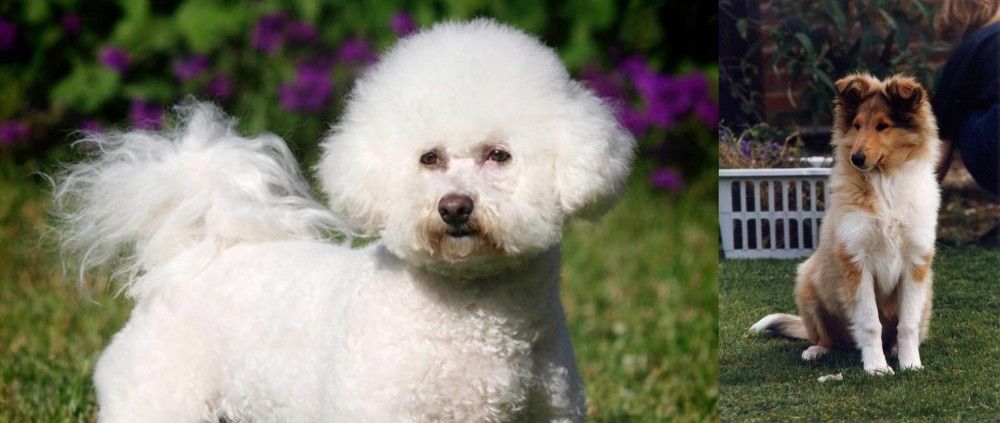 Bichon Frise is originated from Spain but Rough Collie is originated from United Kingdom. Bichon Frise may grow 31 cm / 12 inches shorter than Rough Collie. Bichon Frise may weigh 20 kg / 44 pounds lesser than Rough Collie. Bichon Frise may live 4 years more than Rough Collie. Bichon Frise may have less litter size than Rough Collie. Bichon Frise requires Low Maintenance. But Rough Collie requires Moderate Maintenance
Bichon Frise is originated from Spain but Rough Collie is originated from United Kingdom. Bichon Frise may grow 31 cm / 12 inches shorter than Rough Collie. Bichon Frise may weigh 20 kg / 44 pounds lesser than Rough Collie. Bichon Frise may live 4 years more than Rough Collie. Bichon Frise may have less litter size than Rough Collie. Bichon Frise requires Low Maintenance. But Rough Collie requires Moderate Maintenance
 Contrary to the myths and many of the tales of the history of the Bichon Frise, the breed was originally developed in Spain. Later specific trait development occurred in France to give us the lap dog Bichon Frise that we know today. The original Spanish dog – the Bichon – was a water – sailing dog. It was descended from the poodle breeds crossed with either the water spaniels or the Barbet. These early dogs were friendly and happy and because of this, sailors carried them with them on their ships and even bartered them for supplies. Prior to the 14th century the Spanish probably brought them to the Canary Islands. Later in the 14th century they we discovered again by Italian sailors who returned them to Europe where they lived in the courts of the nobility. During the Renaissance and after the French fell in love with the breed while the Spanish continue to enjoy their presence.
Contrary to the myths and many of the tales of the history of the Bichon Frise, the breed was originally developed in Spain. Later specific trait development occurred in France to give us the lap dog Bichon Frise that we know today. The original Spanish dog – the Bichon – was a water – sailing dog. It was descended from the poodle breeds crossed with either the water spaniels or the Barbet. These early dogs were friendly and happy and because of this, sailors carried them with them on their ships and even bartered them for supplies. Prior to the 14th century the Spanish probably brought them to the Canary Islands. Later in the 14th century they we discovered again by Italian sailors who returned them to Europe where they lived in the courts of the nobility. During the Renaissance and after the French fell in love with the breed while the Spanish continue to enjoy their presence.
In the late 19th century in France the breed fell out of popularity and became street dogs and circus and fair dogs. They also worked with organ grinders and assisted the blind. In the early 20th century, the Societe Centrale Canine, the National Kennel Club of France, adopted the breed’s official standard – while they were still known as both the Bichon and the Tenerife. The popularity of the breed at this time is heavily attributed to “The Adventures of TinTIn” , by Herge, which featured a small, white, fluffy fox terrier. Then the president of the Federation Cynoloqique Internationale presented a new name for the breed based on its characteristics. The name Bichon Frise kept the Bichon heritage and added “curly” the meaning of Frise. Under this name the breed was admitted to the Societe Centrale Canine stud book in October of 1934.
The Bichon Frise came to the United States for the first time in 19554 and was admitted to the American Kennel Club Stud Book in 1972. They entered the non-sporting group of the AKC in 1973. By 2001 the Bichon Frise, J.R., won the Westminster Dog Show. In 1976, the Bichon Frise came to Australia, imported by Harry and Margaret Begg who oversaw the growth of the breed there. Today there are 4 separate breeds believed to be descended from the original Bichon/Tenerife breeds – the Bichon Frise, the Bichon Bolognaise, the Maltese and the Havanese.
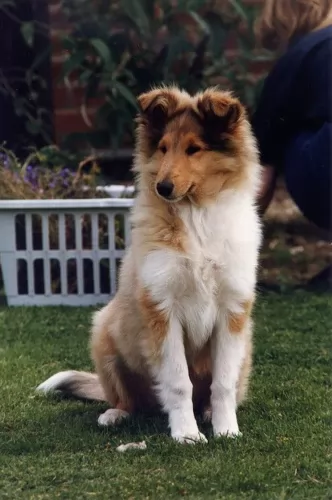 Many people have seen the movie ‘Lassie’, and of course this movie made the Collie popular and famous.
Many people have seen the movie ‘Lassie’, and of course this movie made the Collie popular and famous.
Apart from the Rough Collie, you also get the Smooth Collie. The Rough Collie’s origins start in the 1800’s in Scotland and Wales but unfortunately, the Rough Collie's exact origins are shrouded in lack of information.
These dogs were used as herding dogs in real-life and in movies, and it was in 1879 that the first English Rough Collie was imported to the USA, but it is the UK from whence the dog comes.
 The modern Bichon Frise is a white, small dog with a round skull and muzzle. The nose should be black and the eyes round and dark. Depending on the size of the dog, the legs and head are proportionate to the body, while the tail should be curly and long. Both the tail and the ears must not be docked. Their coat is as hypoallergenic as a dog gets. It is white, dense and for most Bichon Frise, it is curly. They should have black lips as well.
The modern Bichon Frise is a white, small dog with a round skull and muzzle. The nose should be black and the eyes round and dark. Depending on the size of the dog, the legs and head are proportionate to the body, while the tail should be curly and long. Both the tail and the ears must not be docked. Their coat is as hypoallergenic as a dog gets. It is white, dense and for most Bichon Frise, it is curly. They should have black lips as well.
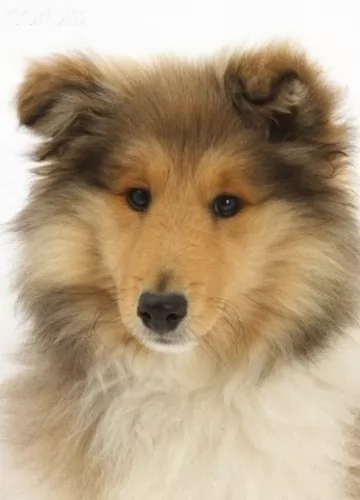 The Rough Collie or Long-haired Collie is considered to be a medium to large sized dog with a long, double-layer coat.You’ll find the coat mainly as tri-colored – white, fawn and dark brown and black.
The Rough Collie or Long-haired Collie is considered to be a medium to large sized dog with a long, double-layer coat.You’ll find the coat mainly as tri-colored – white, fawn and dark brown and black.
The Rough Collie stands at between 51 to 61cm in height and weighs between 18 and 30kg. The long, thin muzzled dog has semi erect, semi-floppy ears, sweet, gentle eyes and a long, plumed tail.
Rough collies are loving, gentle dogs who thrive on spending time with their human families. Their kindly nature makes them good therapy dogs.They don’t do well when left in the back yard on their own day after day. They’re social dogs who love playing with the children in the home and they get on well with other family pets.
The Rough Collie is highly intelligent and he is easy to train. With training and socialization he becomes so well behaved you can take him anywhere.
 The Bichon Frise, according to the American Kennel Club is a cheerful and merry dog. They are gentle, playful, sensitive and affectionate. These dogs love people, are very social and like other dogs as well. They love to play with children and they are intelligent and affectionate. They were developed in their latter stages by the French to be “lap dogs” or companion animals. They are not territorial by nature but can become so if confined and encouraged. Start obedience training early and be consistent throughout their lives. They take to training easily if positive techniques are used. They do however, have a reputation for not taking well to housetraining. Be persistent
The Bichon Frise, according to the American Kennel Club is a cheerful and merry dog. They are gentle, playful, sensitive and affectionate. These dogs love people, are very social and like other dogs as well. They love to play with children and they are intelligent and affectionate. They were developed in their latter stages by the French to be “lap dogs” or companion animals. They are not territorial by nature but can become so if confined and encouraged. Start obedience training early and be consistent throughout their lives. They take to training easily if positive techniques are used. They do however, have a reputation for not taking well to housetraining. Be persistent
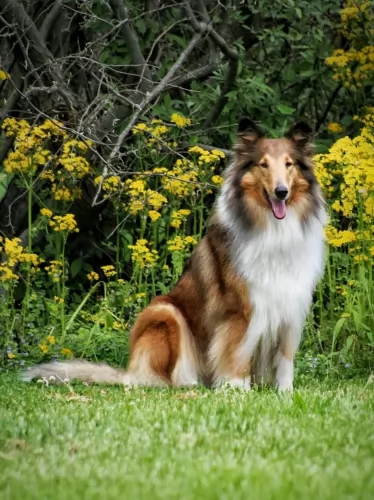 The Rough Collie is such an intelligent dog, but he is loving and devoted too. He can slot into life in the city or countryside because all he really wants is to be close to his human family.
The Rough Collie is such an intelligent dog, but he is loving and devoted too. He can slot into life in the city or countryside because all he really wants is to be close to his human family.
Wherever you live with your Rough Collie though, he will need to be well exercised. He is sweet but slightly timid and will want to be with a family that isn't too noisy in terms of lots of shouting.
People who have had Collies say these dogs make he most awesome pets, and in the right environment these wonderful intelligent dogs will make splendidly loyal, loving pets and companions,
 The coat of the Bichon Frise can easily become matted if not brushed or combed every day. Severe matting can lead to a hematoma in their ears. They are also very prone to ear infections so paying a lot of attention to their ears is imperative. They are will chew and scratch themselves if not groomed well and this can cause skin infections and conditions. They might have allergies to fleas, pollen, chemicals, and dust. The patella (knee cap) can be loose, diabetes, cataracts and heart disease also affect the Bichon Frise. In the United Kingdom the number one cause of death for the breed is old age -13 plus years, with 21% dying of cancer. In North America cancer is the number one killer as it is for most dogs. The Bichon might also be afflicted with hematologic disorders such as AIHA (Autoimmune hemolytic anemia) and ITP (Immune-mediated thrombocytopenia) which while less common than cancer will kill the dog much earlier in life than cancer. The other condition that the Bichon Frise is prone to are liver shunts. If found early they can be surgically corrected but most are not, and liver failure is eventually the cause of death.
The coat of the Bichon Frise can easily become matted if not brushed or combed every day. Severe matting can lead to a hematoma in their ears. They are also very prone to ear infections so paying a lot of attention to their ears is imperative. They are will chew and scratch themselves if not groomed well and this can cause skin infections and conditions. They might have allergies to fleas, pollen, chemicals, and dust. The patella (knee cap) can be loose, diabetes, cataracts and heart disease also affect the Bichon Frise. In the United Kingdom the number one cause of death for the breed is old age -13 plus years, with 21% dying of cancer. In North America cancer is the number one killer as it is for most dogs. The Bichon might also be afflicted with hematologic disorders such as AIHA (Autoimmune hemolytic anemia) and ITP (Immune-mediated thrombocytopenia) which while less common than cancer will kill the dog much earlier in life than cancer. The other condition that the Bichon Frise is prone to are liver shunts. If found early they can be surgically corrected but most are not, and liver failure is eventually the cause of death.
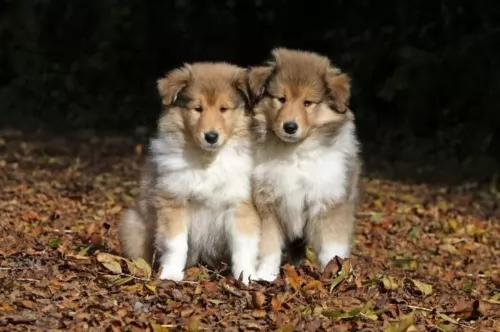 The Rough Collie can reach 12 to 14 years of age with good care. There are always some health issues to be aware of such as hereditary eye diseases. Also, as with most larger breeds, hip dysplasia is always a concern.
The Rough Collie can reach 12 to 14 years of age with good care. There are always some health issues to be aware of such as hereditary eye diseases. Also, as with most larger breeds, hip dysplasia is always a concern.
Other illnesses to look out for include cancer, skin allergies, bloat and Grey Collie Syndrome. As a responsible dog owner, get your pet to the doctor when you notice a change in his behavior – tiredness, vomiting, lethargy, unusual lumps, swelling and a feeling of depression.
This is a form of canine cyclic neutropenia which affects the Collie breed. There is a low concentration of neutrophils in the blood. It can be hereditary or it can develop because of a side effect of chemotherapy for instance. It is essentially caused by a defect in the bone marrow stem cells. Affected dog will always battle with gastrointestinal problems and infections of the eye.The life expectancy of a Collie with this ailment will be less than 3 years.
 Being a small dog, the Bichon Frise is susceptible to obesity and that condition will be terminal in the end for this breed. So make sure you do not overfeed your Bichon Frise. The same is true with the use of treats. The Bichon loves treats and loves the association with treats of having pleased you. They should be fed small meals – about ¼ cup of good high quality dry food twice a day.
Being a small dog, the Bichon Frise is susceptible to obesity and that condition will be terminal in the end for this breed. So make sure you do not overfeed your Bichon Frise. The same is true with the use of treats. The Bichon loves treats and loves the association with treats of having pleased you. They should be fed small meals – about ¼ cup of good high quality dry food twice a day.
As previously mentioned the Bichon Frise is susceptible to:
Hematomas and infections of the ear if not groomed well and consistently.
Cancer is number one killer.
Hematological Issues are deadlier than cancer.
Liver shunts are a very serious concern.
Though the Bichon Frise is not an overly active dog, they do love to play. They are characterized by short bursts of activity followed by long periods of rest. They can be worn out just by running around the house. You must play with them everyday as well as take them on a walk each day. Bichons are fast and agile and do well in agility trials. They also like to compete in rally and obedience trials. Most of all they love to and need to play with their people every day.
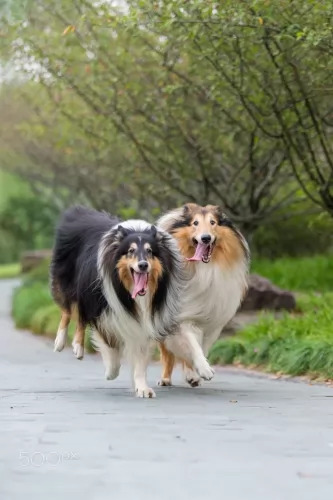 Your Rough Collie does shed so he will require a good brush twice a week. The long silky hair can matt so this grooming session will be important.
Your Rough Collie does shed so he will require a good brush twice a week. The long silky hair can matt so this grooming session will be important.
Your film-star collie is an active, athletic dog. He has always been used to herding sheep, and instinctively he wants to be active. His bright eyes are always alert to some action, and his exercise needs go beyond just allowing him to run around in your back yard.
He is the kind of dog that wants something more energetic such as going on hikes or long walks and running after sticks or balls on the beach.
A Collie is an energetic dog and will require the best dog food there is. If you give him commercially manufactured food make sure it is the right food for his size, his breed and his energy levels.
To add some variety, feed him some home-made food occasionally which can be added to his dry kibble twice a week. Boiled chicken, brown rice or pasta and spinach, sweet potatoes and carrots are a healthy choice for your pet. Try and feed him some raw meat occasionally. Ensure there is always a bowl of fresh, cool water for him.